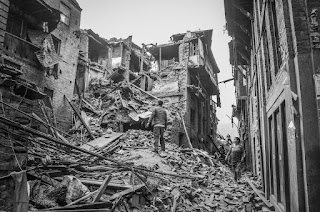Hello Friends ,
Today we learn about Earthquake and why earthquake happens.
An earthquake is a sudden and rapid shaking of the ground caused by the movement of tectonic plates in the Earth's crust. Earthquakes can occur anywhere in the world and can range from minor vibrations to massive, destructive events. Earthquakes are caused by the release of energy stored in the Earth's crust, which creates seismic waves that cause the ground to shake.
There are several reasons why earthquakes occur, including:
Movement of Tectonic Plates: Earthquakes are most commonly caused by the movement of tectonic plates. The Earth's crust is made up of several large plates that move slowly over time, and when these plates collide or move apart, the release of energy can cause an earthquake.
Volcanic Activity: Volcanic eruptions can also cause earthquakes, as the movement of magma and ash underground can trigger seismic activity.
Underground Mining Operations: In some cases, earthquakes can be caused by human activity, such as underground mining operations, which can change the pressure and stress on the Earth's crust, triggering seismic activity.
The location and frequency of earthquakes are determined by several factors, including the type of plate boundary, the age of the plate boundary, and the amount of stress and pressure on the plates. Earthquakes are most commonly found at plate boundaries, where the plates are moving in opposite directions.
The risk of earthquakes is higher at younger plate boundaries, where the plates are still actively moving, and at plate boundaries where there is a build-up of stress and pressure.
The effects of earthquakes can be devastating and long-lasting. Earthquakes can cause damage to buildings and infrastructure, including roads, bridges, and schools. They can also trigger tsunamis and landslides, leading to further damage and loss of life. Earthquakes can result in the loss of power and other essential services, making it difficult for people to access the help they need. Additionally, earthquakes can have secondary effects, such as fires and economic disruption, which can make it difficult for communities to recover from the disaster.
To prepare for earthquakes, it is important for individuals and communities to understand the risks in their area and take steps to secure their homes and property.
This can include retrofitting buildings, creating an emergency supply kit, and having a plan for what to do during an earthquake. It is also important to stay informed about the latest earthquake news and advice from local authorities. By being informed and proactive, we can reduce the impact of earthquakes and help ensure the safety and well-being of ourselves and our communities.
In conclusion, earthquakes are a natural phenomenon that can have a profound impact on individuals and communities. While we cannot prevent earthquakes from occurring, we can prepare for them and reduce the impact they have on our lives. By understanding the causes of earthquakes, being informed about the risks in our area, and taking steps to secure our homes and property, we can help ensure the safety and well-being of ourselves and our communities during this time of crisis.



